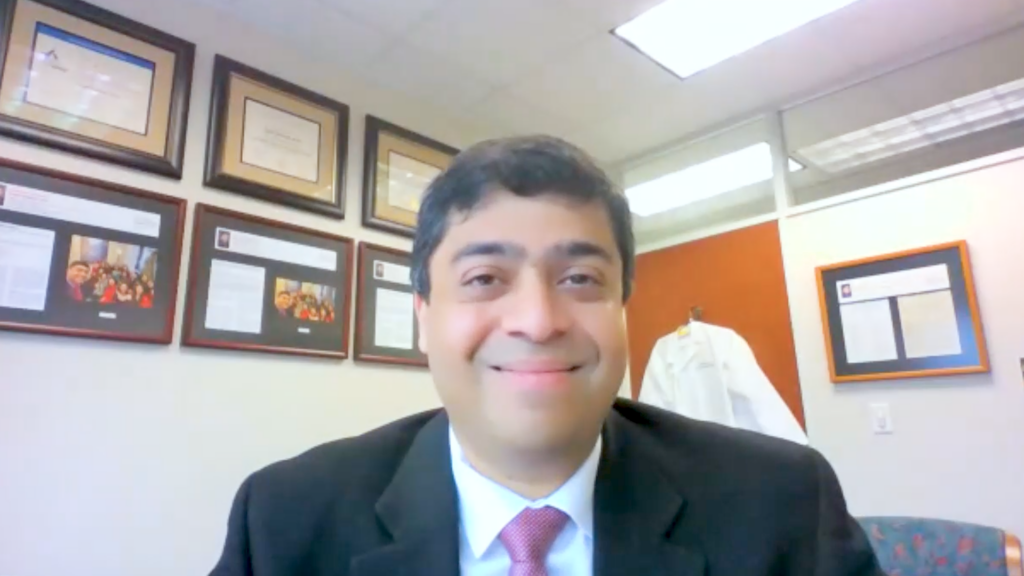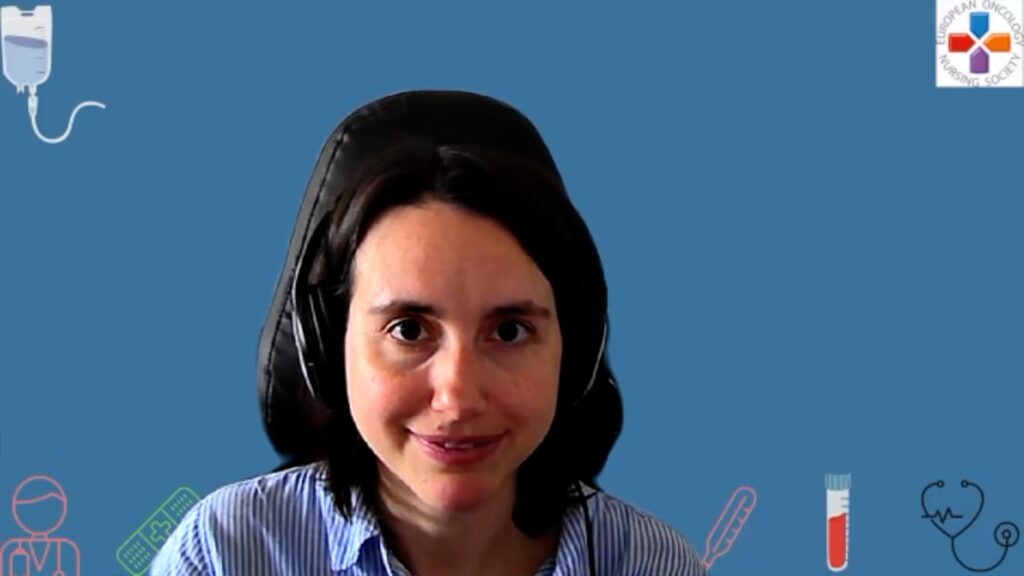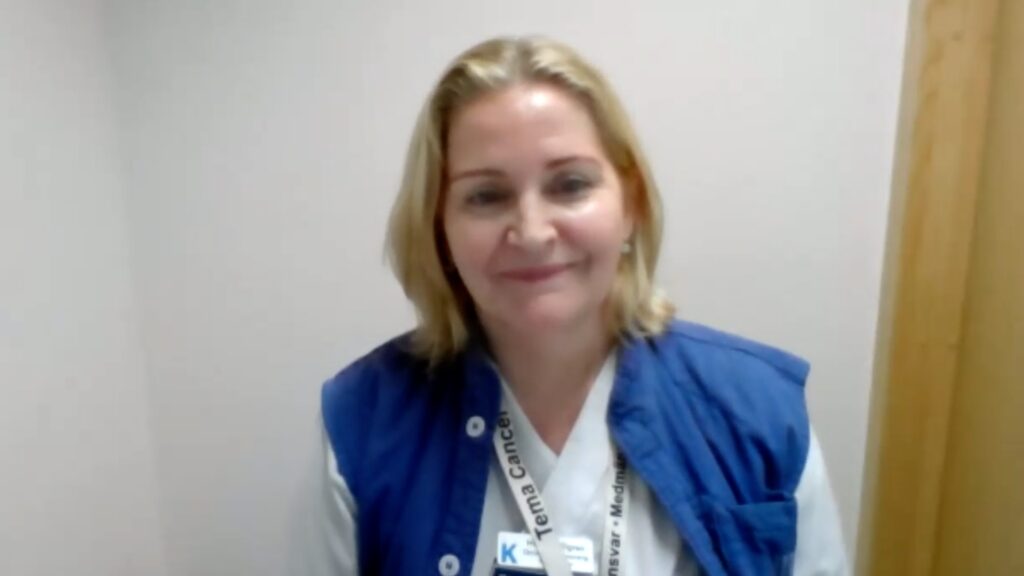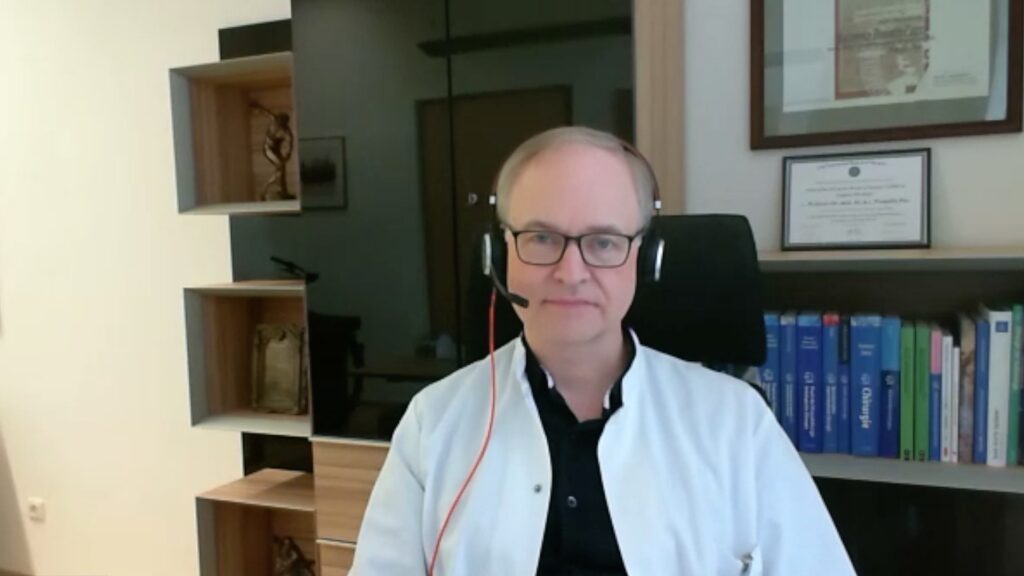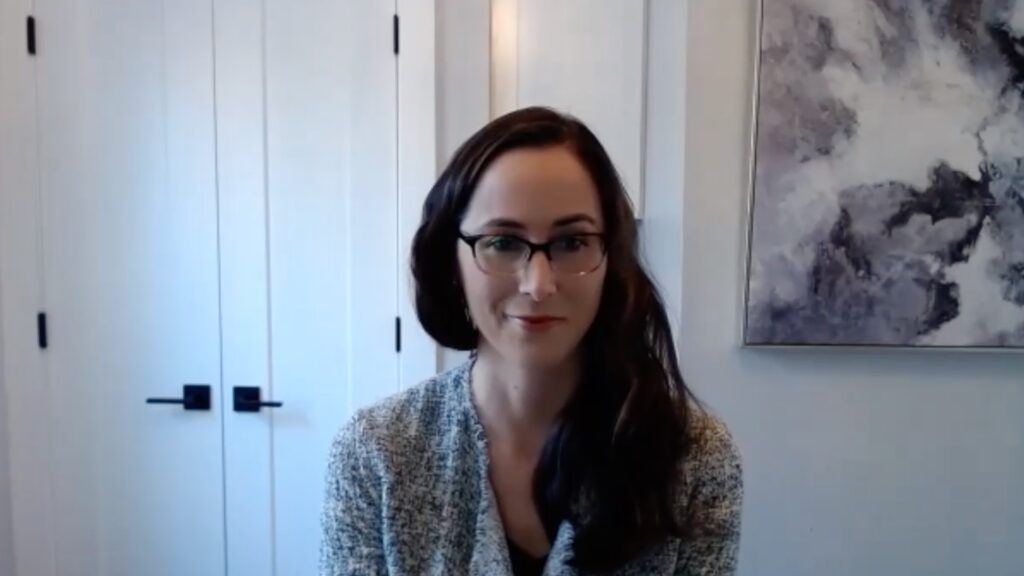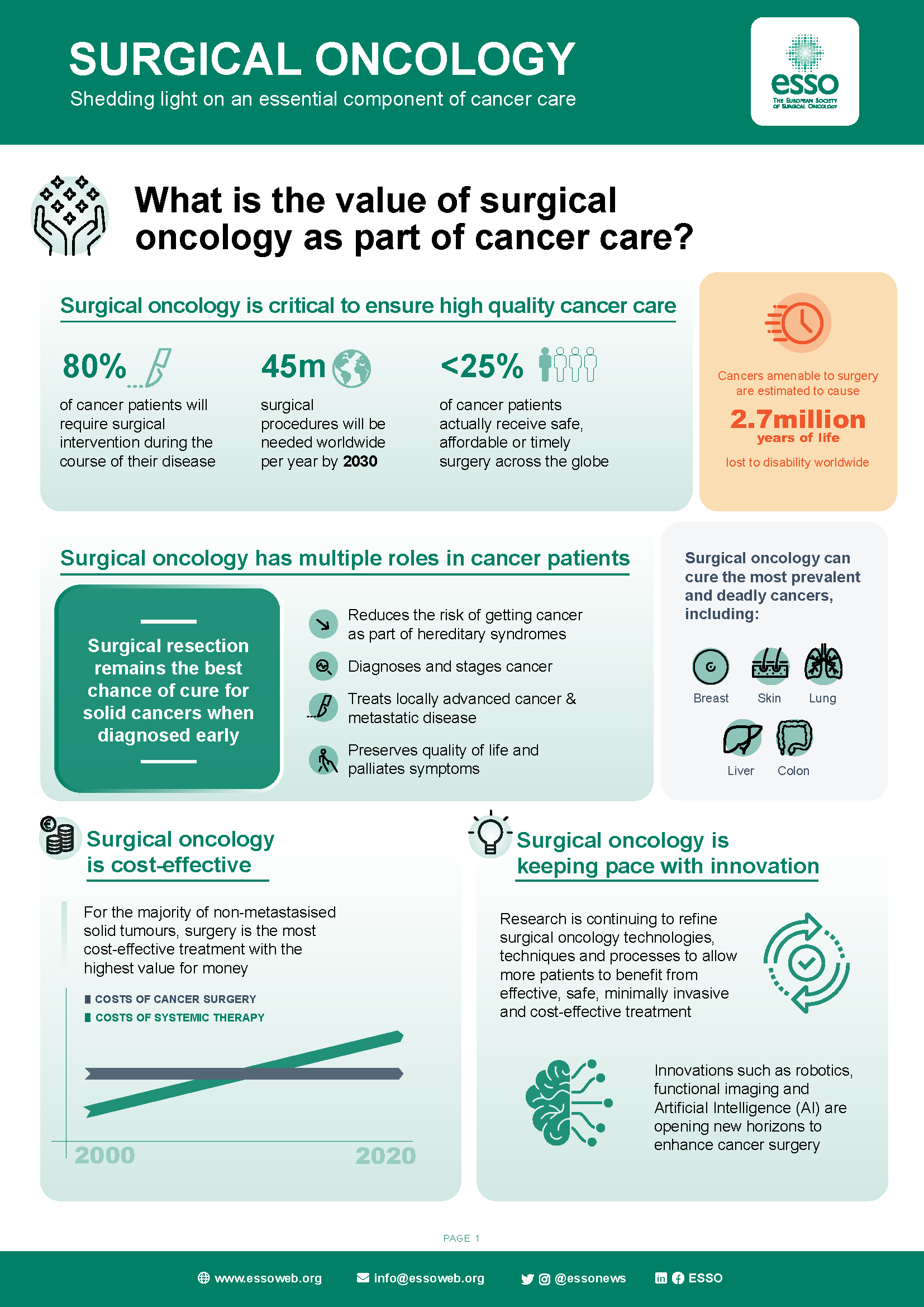
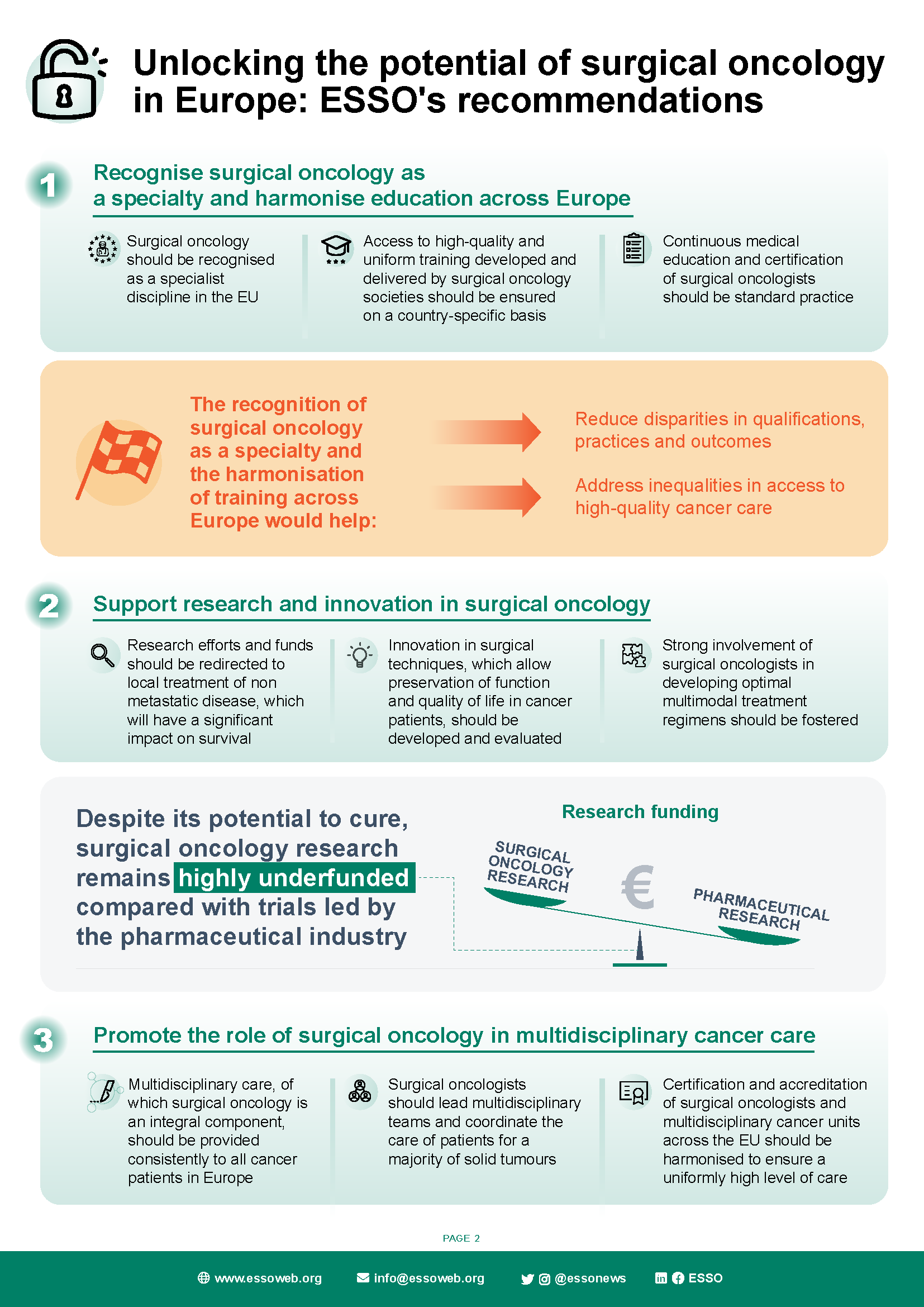
The Europe’s Beating Cancer Plan (EBCP) – fuelled by the significant work of the European Parliament’s Special Committee on Beating Cancer (BECA) committee – defines ambitious steps towards establishing a comprehensive and coordinated strategy in the fight against cancer. It acknowledges the vital role of surgical oncology as part of cancer care.
The BECA report outlines the need for surgical skills to be strengthened across Europe through the recognition of surgical oncology as a specialist discipline, the harmonisation of standards of care, and patients’ access to specialised care and innovative surgical procedures.
The pivotal role of surgery in multimodal cancer care
Surgical intervention remains the best chance of cure for solid cancers when diagnosed at an early stage despite the increasing use of multimodal treatments. It is estimated that around 80% of cancer patients will require surgical intervention during the course of their diseases; and 45 million surgical procedures will be needed globally by 2030. Yet, less than 25% of cancer patients actually have access to safe, affordable or timely surgery worldwide.
Cancer surgery delivered by trained specialists is a vital component of high quality cancer care. Surgical oncologists have a deep understanding of the biology of cancers as well as the pillars of multidisciplinary cancer management. Furthermore, they play an increasing role in evidence-based multidisciplinary care, fostering optimal coordination at all stages of cancer treatment.
Despite this, surgical oncology does not receive sufficient recognition in Europe. Greater political and financial attention is needed in order to meet the increasing needs of cancer patients in Europe.
The realisation of the EBCP cannot be achieved without an inclusive approach embracing all cancer treatment modalities, such as surgical oncology, and leveraging their strengths.
Offering specialist advice and multi-faceted support to realise the Plan
The implementation roadmap published by the Commission provides a clear timeline for stakeholders and experts to maximise their support towards the realisation of the plan. The indicators set out shall help monitor and evaluate the success of the work carried out, and recalibrate efforts where needed.
ESSO is committed to supporting the activation and success of this ambitious Plan, by channelling the expertise and knowledge of the surgical oncologists’ community at all stages of the implementation journey, building on its specialty network from across Europe and the available scientific evidence.
Concrete initiatives
In particular, surgical oncologists can provide significant support to advance the following pillars and initiatives of the Plan:
PILLAR: ‘PUTTING RESEARCH, INNOVATION AND NEW TECHNOLOGIES AT THE SERVICE OF CANCER PREVENTION AND CARE’
Research and innovation in surgical oncology improve the safety, efficacy and cost-effectiveness of cancer care. Advances in the area are required to fully unlock the prospects of surgical oncology.
Knowledge Centre on Cancer and Cancer Mission Board and Harmonised Curriculum
- ESSO can provide expertise and resources in the field of surgical oncology to complement the Knowledge Centre, in order to pool the evidence necessary for effective policy making in cancer prevention, detection – including novel approaches – and treatment. It could also contribute to the development of the specific Knowledge Gateway Briefs in various areas.
- Despite recent advances, for example in refining the safety, efficacity and costeffectiveness of surgical procedures, cancer surgery remains highly underfunded in Europe. Yet, the potential to obtain positive outcomes is greater for non-metastasised cancers than for metastasised cancers. ESSO can support the definition of collaborative research projects under the European research programmes, and the work of the Mission Board to increase research in such areas of unmet needs, while ensuring the active involvement of patients.
- ESSO can also help shape future research priorities to initiate and drive interdisciplinary research efforts to foster patient-centred care models and reduce health inequalities between and within Member States.
PILLAR: ‘IMPROVING EARLY DETECTION OF CANCER’
Cancer surgery plays a fundamental role in preventing or detecting cancer. Screening programmes can help detect cancer at an early-stage, when curative surgery has a greater chance to be successful. Further, performing resections in patients who have hereditary conditions that may cause a predisposition to cancer help to prevent cancer to develop. In previously treated patients, the follow-up performed by surgeons can support early detection of metastases.
European Guidelines and Quality Assurance schemes on cancer screening, diagnosis, treatment, rehabilitation, follow-up and palliative care for breast and colorectal cancer
- Breast cancer is one of the main cancer types where the contribution of surgical oncology is vital. ESSO can provide expertise to develop the upcoming scheme for breast cancer, and support its uptake across Europe by working with its network of national societies.
- The European Cancer Organisation Essential Requirements for Quality Cancer Care (ERQCC) papers developed as a joint effort of the cancer community, with the contribution of ESSO, can inform the new guidelines and QA schemes for colorectal cancer. Surgical oncology experts can provide further guidance in the shaping of these guidelines, to improve screening and timely diagnosis.
- The update of the Council recommendations on cancer screening is an opportunity to reflect latest scientific evidence and include other cancer types associated with a high burden and that are most likely to be cured with surgical oncology if detected early (e.g. Lung, cervix, skin and prostate cancers).
PILLAR: ‘ENSURING HIGH STANDARDS IN CANCER CARE’
Surgical treatment is integral to multidisciplinary care. Improving education and standards of surgical oncology uniformly across Europe would provide patients with equal chances to receive high quality cancer surgery, delivered by trained and qualified professionals.
EU Network of National Comprehensive Cancer Centres (CCCs) including ‘EU Cancer Treatment Capacity and Capability Mapping’ project
- Certification and accreditation of cancers units, involving continuous monitoring and audit, would help increase and unify standards of care provided to patients across Europe. Surgical oncologists stand ready to share recommendations on minimum requirements for CCCs (including surgeon and hospital volumes), on certification and accreditation, as well as on monitoring and audit of CCCs in relation to state-of-the-art surgical oncology practices.
- ESSO clinical practice guidelines can guide the development of organizational specifications for CCCs, with country-based information. ESSO can also help develop mechanisms to establish and sustain multidisciplinary care, fully involving surgical oncology experts.
- With its network of specialist societies, ESSO can provide evidence for the mapping project through the identification of surgical oncology capacity and capability in Member States. Inter-specialty cancer training programme
- With surgical oncology being a core component of multidisciplinary cancer care, ESSO’s core curricula can provide a framework to build on when developing the training programme, together with the global curriculum jointly developed by ESSO and the Society of Surgical Oncology (SSO), which aims to address the gaps and inadequacies in training of specialists. Such a harmonised, inter-specialty curriculum should provide the required level of knowledge and facilitate standardization across EU Member States.
- ESSO can provide additional intelligence on the specific needs of each country with regards to inter-specialty training, to harmonise surgical oncology education in the EU.
PILLAR ‘REDUCING CANCER INEQUALITIES ACROSS THE EU’
Reducing inequalities in access to specialist care across Europe is key to ensure all patients can benefit from optimal cancer surgery.
Cancer Inequalities Registry
- ESSO can provide advice for the definition of indicators for the upcoming registry, providing ways to compensate disparities across Europe.
- Further, ESSO’s network of national surgical oncology societies can provide data to feed into the upcoming registry, notably evidence and intelligence on disparities in access to cancer surgery across Europe, variations in standards of care, quality of surgical oncology care, and harmonisation of practices in EU member states.
New European Reference Networks in poor prognosis cancers, and specific conditions related to genomics in cancer care
- ESSO can advise on criteria for reference centres and help identify those with demonstrated specialised surgical expertise in given cancers, and support their participation in the ERNs
- ESSO can play a pivotal role at the interface of ERNs and individual specialists, ensuring dialogue and promoting involvement in the ERNs
Beyond these examples, ESSO is committed to support each pillar of the plan, notably taking part in initiatives in the areas of cancer prevention, and improving the quality of life of patients and families.
Surgical oncology specialists work is driven by the mission to provide the highest quality cancer care to patients. As such, they are committed to embedding the latest science and state-of-the-art practice of surgical oncology in EU initiatives and onco-policy. The EBCP is an unprecedented milestone of EU action in the field, and will require the expertise and knowledge of all specialists to become a reality for the benefit of each cancer patient across Europe.


